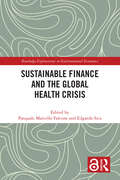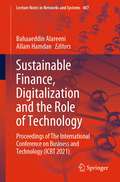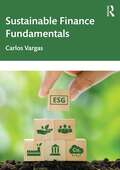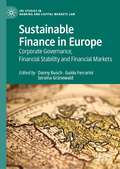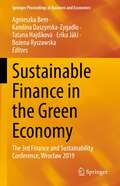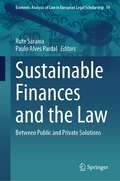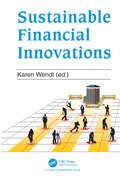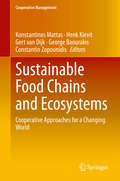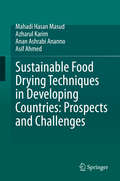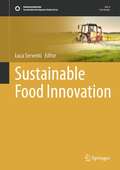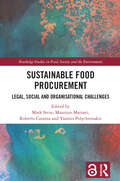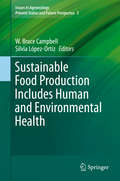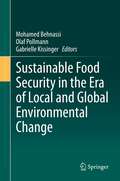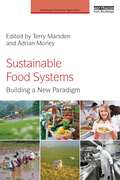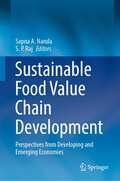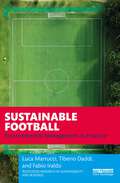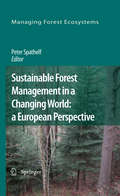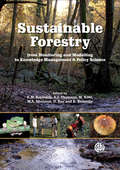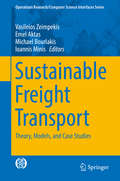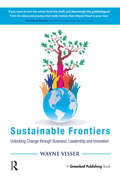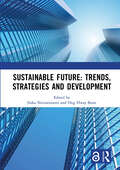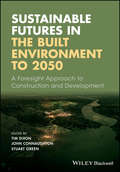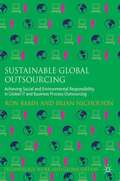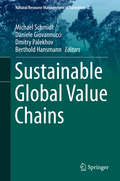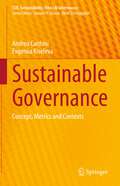- Table View
- List View
Sustainable Finance and the Global Health Crisis (Routledge Explorations in Environmental Economics)
by Pasquale Marcello Falcone Edgardo SicaThe speed with which the various economies recover from the Covid-19 pandemic will significantly determine the economic pressure placed on the environment in the medium-to-long-term. Furthermore, the pandemic has highlighted the strong interrelations between natural and societal systems, with societal resilience depending on a resilient environmental support system. In this context, the book argues that the pandemic represents a wake-up call for financial systems to be better prepared for the climate crisis and social risk, and has provided a stimulus to scale down the reliance of the global economy on fossil fuels. The first part of the book provides a deep and creative discussion between leading international researchers and experts on the policy options and financial instruments which can help to catalyze the green finance transition in the post-Covid-19 era. The contributions show that sustainable finance is emerging as a powerful tool to advance the transition towards a more environmentally and socially sustainable economic model. Instruments such as sovereign green bonds, green securities, and other sustainability-related securities can play a significant role in the post-Covid-19 world to fund economic stimulus and to lead the way to new and more sustainable future. The second part of the book supports the debate by highlighting a number of selected case studies on financing transitions in different regional contexts including Africa, Asia, Europe, and Latin America. The book marks a significant contribution to the literature on environmental economics and finance, climate change, and sustainability transitions.
Sustainable Finance, Digitalization and the Role of Technology: Proceedings of The International Conference on Business and Technology (ICBT 2021) (Lecture Notes in Networks and Systems #487)
by Allam Hamdan Bahaaeddin AlareeniThis book constitutes the refereed proceedings of the International Conference on Business and Technology (ICBT2021) organized by EuroMid Academy of Business & Technology (EMABT), held in Istanbul, between 06–07 November 2021. In response to the call for papers for ICBT2021, 485 papers were submitted for presentation and inclusion in the proceedings of the conference. After a careful blind refereeing process, 292 papers were selected for inclusion in the conference proceedings from forty countries. Each of these chapters was evaluated through an editorial board, and each chapter was passed through a double-blind peer-review process.The book highlights a range of topics in the fields of technology, entrepreneurship, business administration, accounting, and economics that can contribute to business development in countries, such as learning machines, artificial intelligence, big data, deep learning, game-based learning, management information system, accounting information system, knowledge management, entrepreneurship, and social enterprise, corporate social responsibility and sustainability, business policy and strategic management, international management and organizations, organizational behavior and HRM, operations management and logistics research, controversial issues in management and organizations, turnaround, corporate entrepreneurship, innovation, legal issues, business ethics, and firm governance, managerial accounting and firm financial affairs, non-traditional research, and creative methodologies.These proceedings are reflecting quality research contributing theoretical and practical implications, for those who are wise to apply the technology within any business sector. It is our hope that the contribution of this book proceedings will be of the academic level which even decision-makers in the various economic and executive-level will get to appreciate.
Sustainable Finance Fundamentals
by Carlos VargasSustainable Finance Fundamentals provides an accessible overview of this critical, rapidly growing area at the intersection of finance and sustainability. The first part showcases different approaches to sustainable finance, covering banking, impact investing, integrated reporting and strategy, and risk management. The second part covers investing, including equity, green bonds, and crowdfunding. In the final part, issues beyond sustainable finance, such as alternative investments, renewable energy, and innovation, are explored. In addition, two optional appendices provide useful introductions to the time value of money (TVM) and financial statements. Ethical and regulatory issues are addressed holistically throughout the book and sustainable finance is linked to related topics, such as environmental economics and the UN Sustainable Development Goals. Each chapter has an international focus and features examples, "in a nutshell" summaries, and discussion questions. Whether you are a student or professional, Sustainable Finance Fundamentals is essential reading for anyone looking to gain a comprehensive understanding of sustainable finance, impact investing, and related areas. Lecture slides and teaching notes are also available for instructors, making this book an ideal text for courses on sustainable finance.
Sustainable Finance in Europe: Corporate Governance, Financial Stability and Financial Markets (EBI Studies in Banking and Capital Markets Law)
by Danny Busch Guido Ferrarini Seraina GrünewaldThe aim of this edited volume is to bring together the views of expert academics and practitioners on the latest regulatory developments in sustainable finance in Europe. The volume includes a wide range of cutting-edge issues, which relate to three main themes along which the volume is structured: (1) corporate governance; (2) financial stability; and (3) financial markets. With individual contributions deploying different methods of analysis, including theoretical contributions on the status quo of macro-financial research as well as law and economics approaches, the collection encourages interdisciplinary readership and will appeal to those researching capital markets law, European financial law, and sustainable finance, as well as practitioners within the finance industry.
Sustainable Finance in the Green Economy: The 3rd Finance and Sustainability Conference, Wrocław 2019 (Springer Proceedings in Business and Economics)
by Agnieszka Bem Bożena Ryszawska Erika Jáki Karolina Daszynska-Zygadlo Tatana HajdíkováThis book explores issues related to green and sustainable finance which aims at the transformation of economies into a new, more sustainable model. It covers a variety of issues related to various financial areas, such as: corporate finance, public finance, monetary and fiscal policy, and risk management. The enclosed papers reflect the extent, diversity, and richness of research areas in the finance and sustainability fields, both fundamental and applied, and are beneficial to researchers, practitioners, scholars and policy makers in economics, finance, and international economics.
Sustainable Finances and the Law: Between Public and Private Solutions (Economic Analysis of Law in European Legal Scholarship #16)
by Rute Saraiva Paulo Alves PardalSustainable (public and private) finance is closely interlinked with the Sustainable Development Goals (SDGs). The latter focus on enhancing the protection of both social and environmental assets at the local and global level, from the real economy and everyday life to financial markets and public policies, thereby laying the groundwork for a transition. Global sustainability challenges – including climate change, natural resource depletion, and rising inequality – are affecting the commercial environment and real economy in a way that presents both risks and opportunities for the private and public financial sectors. On the one hand, policymakers and investors (including banks and pensions funds) are increasingly recognizing the environment’s implications for the financial sector through both physical and transitional risks, producing impacts on financial services and products, not to mention corporate governance. On the other hand, governments and European and international institutions are aware of their sustainability-related responsibilities and the consequences of their actions. Both regulate and supervise financial markets but also use their budgetary and tax policies (e.g. carbon tax) and their participation in financial markets (e.g. green bonds and development banks) to overcome sustainability challenges. Therefore, the objective of this book is to help readers understand how private and public financial systems can be modified to create better value for society through sustainable approaches and initiatives such as the integration of environmental, social, and governance (ESG) factors in investment, procurement, and budgeting.
Sustainable Financial Innovation: Risk Management Frameworks, Sustainable Financial Innovation And Softlaw Standards (CSR, Sustainability, Ethics & Governance)
by Karen WendtInnovations and consequently future-fitness must form new models and address existing hurdles and new forms of collaborations. They must enable faster innovation cycles and "intelligence mining" by combining open and closed source systems, organic communities, open space techniques and cross-fertilization. Innovations must apply to and integrate incubation and acceleration networks. This book explores new concepts for future-fitness with five capitals: financial, ecological, social/cultural, human/personal, and manufactured/technological. It offers a new integral framework bringing researchers and business leaders together in one volume.
Sustainable Food Chains and Ecosystems: Cooperative Approaches for a Changing World (Cooperative Management)
by Constantin Zopounidis George Baourakis Gert Van Dijk Konstantinos Mattas Henk KievitUnarguably, preserving the ecosystem, securing sustainability and understanding the dynamics of agro-food chains have all become vital policy objectives with several interlinked dimensions. The main objectives of this book are to draw the attention of researchers, policymakers and businesspeople to the relation between agro-food chains and the ecosystem, and to demonstrate the importance of building resilient agro-food chains that take into account climate change and environmental challenges. Agro-food chains as they function today can serve as powerful tools for promoting sustainable forms of agriculture, consumption and production that are embedded in a viable ecosystem. The book addresses a range of environmental, methodological and societal issues from a transaction perspective, while also providing extensive background information on the topic, and outlining future applications and research directions.
Sustainable Food Drying Techniques in Developing Countries: Prospects and Challenges
by Mahadi Hasan Masud Azharul Karim Anan Ashrabi Ananno Asif AhmedThis book presents a comprehensive review of renewable energy-based sustainable drying techniques for developing countries. Aspiring towards a world with zero food waste, the book has provided discussion on sustainable drying techniques in terms of energy efficiency. The socio-economic condition of each developing country is unique; therefore, has specific technological requirements. As such, the book presents discussions on food waste scenario around the world, the socio-economic status of developing countries and their correlation with food. The book gives an overview of the quality aspects of drying, along with the required energy and time to retain these features. Additionally, a method of selecting drying techniques for developing countries, taking the cost and safety factor into consideration, has been discussed extensively Also, the renewable and non-renewable energy resources of low income, lower-middle income, middle income, and high-income developing countries have been analyzed and presented. The book also highlights the available drying techniques that are currently being practiced by the consumers and industries of developing countries. The book recommends ten sustainable drying technologies for the developing countries and describes their working principle. Discussion on potential challenges for sustainable drying technology adoption is also presented. The book presents up-to-date research on sustainable drying techniques and their impact on developing countries to reduce food waste.Food waste is not only a humanitarian concern but also a threat to environmental sustainability. Currently, one-third of all produced food is being wasted, when nearly 805 million people - including children remain undernourished on a daily basis. In an effort to solve this crisis, a number of food preservations techniques are being practiced in food supply chain. Drying is one such preservation technique that prevents microbial proliferation, slows enzymatic reaction and preserves the physio-chemical properties of food. Albeit, drying is an effective means of food preservation; it is also highly energy-intensive. Developing countries do not have sufficient energy and financial resources to adopt conventional (expensive and high energy) drying techniques. As such, this is the first reference work dedicated to discussing the prospects and challenges of sustainable (renewable energy based and inexpensive) drying techniques for developing countries in order to reduce food waste. Sustainable food drying techniques in developing countries: Prospects and Challenges is a singular work in the field of food preservation and affordable drying technology.
Sustainable Food Innovation (Sustainable Development Goals Series)
by Luca ServentiThis text offers a holistic approach to the two topics of the highest interest in the current and future food industry: sustainability and nutrition. The current knowledge is narrow and specific to individual topics focusing on either one nutrient or one discipline. Food is part of a wide circle of disciplines: nutrition, technology, sensory, environmental aspects, psychology, economy, culture and society. In the recent years, the sales of innovative foods such as meatless burgers, allergen-free products and personalized nutrition have skyrocketed. Sustainable Food Innovation presents the big picture on each nutrient: industrial and natural sources (ingredients, food products), consumer acceptability (price, sensory quality) and nutritional properties (quantity and quality) with each chapter focusing on a specific essential nutrient. Further chapters illustrate the role of other elements of interest such as bioactive. In addition, experimental data is added to enrich the book. Online discussions on current food trends are analyzed and presented to the reader in the effort to understand consumers’ psychology. This will be the first publication to combine literature review and research data and the first to offer a comprehensive discussion on sustainable food innovation. The ultimate goal is to educate consumers and experts, providing technical and socioeconomic knowledge in a multidisciplinary context. Ultimately, informed technologists will develop healthier, sustainable food products and informed consumers will make informed decisions on nutrition and food choices.
Sustainable Food Procurement: Legal, Social and Organisational Challenges (Routledge Studies in Food, Society and the Environment)
by Mark Stein Maurizio Mariani Roberto Caranta Yiannis PolychronakisThe book examines sustainable food procurement policy and practice in the European Union and beyond, exploring the extent to which sustainability objectives have been achieved and evaluating the new developments taking place at both EU and national levels.While there is a growing recognition that public authorities can use public procurement as a policy tool to pursue multiple environmental, health and socio-economic objectives, contracting authorities still face many challenges. This volume investigates the scope for pursuing sustainable objectives in public procurement of food and catering services, examining different regulatory contexts and organisational models to answer the overall question of how to integrate sustainability concerns into the various phases of public food procurement processes. Contributions in the book examine the policy and legal procurement framework and practices for sustainable public catering in three EU Member States: Italy, France and Spain. There is a comparative survey of the Baltic Region, including Denmark, Estonia, Finland, Poland and Russia, and moving beyond the EU, there is examination of the UK and Brazil, as well as a cross country comparison of the UK with Denmark and Sweden. Drawing on the expertise of an interdisciplinary and intersectoral team of contributors allows the book to benefit from the insights of different disciplines, including business sciences, anthropology and law. Tapping into the global discussion on public food procurement as a means to achieve multiple social and environmental goals, this work will stimulate readers looking for new creative ways to create value through public food purchasing.This book will be of great interest to students, researchers, policymakers and public- and private-sector representatives interested in public procurement, food policy and law, sustainable food sourcing and supply chain management.
Sustainable Food Production Includes Human and Environmental Health
by W. Bruce Campbell Silvia López-OrtízAgroecology not only encompasses aspects of ecology, but the ecology of sustainable food production systems, and related societal and cultural values. To provide effective communication regarding status and advances in this field, connections must be established with many disciplines such as sociology, anthropology, environmental sciences, ethics, agriculture, economics, ecology, rural development, sustainability, policy and education, or integrations of these general themes so as to provide integrated points of view that will help lead to a sustainable construction of values. Such designs are inherently complex and dynamic, and go beyond the individual farm to include landscapes, communities, and biogeographic regions by emphasizing their unique agricultural and ecological values, and their biological, societal, and cultural components and processes.
Sustainable Food Security in the Era of Local and Global Environmental Change
by Gabrielle Kissinger Mohamed Behnassi Olaf PollmannThis volume discusses a broad range of vital issues encompassing the production and consumption of food in the current period of climate change. All of these add up to looming, momentous challenges to food security, especially for people in regions where malnutrition and famine have been the norm during numerous decades. Furthermore, threats to food security do not stop at the borders of more affluent countries - governance of food systems and changes in eating patterns will have worldwide consequences. The book is arranged in four broad sections. Part I, Combating Food Insecurity: A Global Responsibility opens with a chapter describing the urgent necessity for new paradigm and policy set to meet the food security challenges of climate change. Also in this section are chapters on meat and the dimensions of animal welfare, climate change and sustainability; on dietary options for mitigating climate change; and the linkage of forest and food production in the context of the REDD+ approach to valuation of forests. Part II, Managing Linkages Between Climate Change and Food Security offers a South Asian perspective on Gender, Climate Change and Household Food Security; a chapter on food crisis in sub-Saharan Africa; and separate chapters on critical issues of food supply and production in Nigeria, far-Western Nepal and the Sudano-Sahelian zone of Cameroon. Part III examines Food Security and patterns of production and consumption, with chapters focused on Morocco, Thailand, Bahrain, Kenya and elsewhere. The final section discusses successful, innovative practices, with chapters on Food Security in Knowledge-Based Economy; Biosaline Agriculture in the Gulf States; Rice production in a cotton zone of Benin; palm oil in the production of biofuel; and experiments in raised-bed wheat production. The editors argue that technical prescriptions are insufficient to manage the food security challenge. They propose and explain a holistic approach for adapting food systems to global environmental change, which demands the engagement of many disciplines - a new, sustainable food security paradigm.
Sustainable Food Systems: Building a New Paradigm (Earthscan Food and Agriculture)
by Terry Marsden Adrian MorleyIn response to the challenges of a growing population and food security, there is an urgent need to construct a new agri-food sustainability paradigm. This book brings together an integrated range of key social science insights exploring the contributions and interventions necessary to build this framework. Building on over ten years of ESRC funded theoretical and empirical research centered at BRASS, it focuses upon the key social, economic and political drivers for creating a more sustainable food system. Themes include: regulation and governance sustainable supply chains public procurement sustainable spatial strategies associated with rural restructuring and re-calibrated urbanised food systems minimising bio-security risk and animal welfare burdens. The book critically explores the linkages between social science research and the evolving food security problems facing the world at a critical juncture in the debates associated with not only food quality, but also its provenance, vulnerability and the inherent unsustainability of current systems of production and consumption. Each chapter examines how the links between research, practice and policy can begin to contribute to more sustainable, resilient and justly distributive food systems which would be better equipped to ‘feed the world’ by 2050.
Sustainable Food Value Chain Development: Perspectives from Developing and Emerging Economies
by Sapna A. Narula S. P. RajThe book addresses the gap that exists in sustainable value chain development in the context of developing and emerging economies in meeting the sustainable development goals. The book adopts a holistic approach and discusses significant aspects of the topic such as challenges, opportunities, best practices, technology and innovation, business models, and policy formulation. The chapters focus on all the existing and potential actors in the value chain. Comprising invited chapters from leading researchers, policymakers, practitioners, and academicians working on this topic, this edited book is useful for scientists, researchers, students, research scholars, and practitioners as it builds the latest interdisciplinary knowledge in the area. An important aspect of the book is the case studies of already ongoing projects from various emerging economies around the world. Contributions are divided into four sections—sustainable food systems and circular economy: tackling resource use, efficiency, food loss, and waste problems; technology and innovation for food value chain development; toward responsible food consumption; linking small farmers to markets: markets, institutions, and trade. Significantly, the book is organized in the context of Sustainable Development Goals and has direct relevance and linkages with SDG 1 (poverty alleviation), SDG 2 (zero hunger), SDG 3 (good health and well-being), SDG 4 (quality education), SDG 5 (gender equality), SDG 12 (responsible consumption and production), SDG 13 (climate action), and SDG 17 (partnerships).
Sustainable Football: Environmental Management in Practice (Routledge Research in Sustainability and Business)
by Luca Marrucci Tiberio Daddi Fabio IraldoThis book provides a comprehensive, up-to-date overview of the different environmental strategies adopted in the football world to foster sustainability. The authors lay out useful insights, both for scholars and practitioners, to improve good governance in football organisations by empowering environmental organisational and operational actions. As well as examining practical methods of implementing green initiatives, the book discusses their added value from different perspectives including football fans, football managers and policymakers. By identifying the most important green actions for the dissemination of environmentally friendly behaviours at both individual and organisational levels, the book demonstrates how football organisations can use operational and organisational methods to develop an environmental sustainability strategy. The book contributes to developing the role of the football world by covering different facets of sustainability such as the circular economy, climate change, green marketing, fans engagement and more. It will be a valuable resource for scholars and students of environmental management, sustainable business and corporate social responsibility, as well as professionals working in the football industry.
Sustainable Forest Management in a Changing World: A European Perspective (Managing Forest Ecosystems #19)
by Peter SpathelfYet another book on the topic of ‘Sustainable Forest Management’ can only be justified by new information that is of direct relevance. The contents of this volume concentrate on the very latest factors and developments, thus, hopefully, contributing both to the book’s attractiveness and to closing gaps in the discipline’s database. This book is written for researchers in the field of forest management, international forestry, and climate change-related issues, legal and policy advisors, as well as for managers of private companies who deal with SFM. The authors of the various sections are scientists in the field of forestry and other environmental sciences. They represent different institutions, mainly universities and research agencies in Germany, but also high-level international institutions in development co-operation, such as the World Bank, FAO, and IIASA. The scope of the book is to refresh the meanings and perceptions of SFM against the background of the rapid changes in our natural and social environment. Climate change and the rapid increase of atmospheric CO concentration is a global process 2 with negative impacts of different kinds, among others on natural ecosystems such as forests. A crucial issue therefore is how forest management can contribute to forest conservation in light of changing climatic conditions. Moreover, policy changes such as the introduction of certification schemes and the new emphasis laid on Non-Wood Forest Products justify the re-evaluation of the role of SFM in delivering ecological goods and services from our forests.
Sustainable Forestry: From Monitoring and Modelling to Knowledge Management and Policy Science
by M. A. Shannon A. J. Thomson K. M. Reynolds M. Kohl D. Ray K. RennollsThis book presents the issues related to both global climate change and conservation of biodiversity. It highlights four methodologies and shows how they contribute in overcoming the ecological challenges facing our world.
Sustainable Freight Transport: Theory, Models, And Case Studies (Operations Research/computer Science Interfaces Ser. #63)
by Vasileios Zeimpekis Emel Aktas Michael Bourlakis Ioannis MinisThis book presents the latest technologies and operational methods available to support sustainable freight transport practices. It highlights market requirements, cutting edge applications, and case studies from innovators in the logistics services industry. The goal is to help bridge the gap between advanced computational techniques and complex applied problems such as those in sustainable transport and logistics operations. Freight transport has traditionally focused on costs and service levels. However, it is no longer possible or socially responsible to neglect the environmental, social, climate, and energy implications of the freight moving globally. This book places sustainability at the forefront of the freight transport agenda. Sustainable Freight Transport: Theory, Models and Case Studies is divided into three sections. Section I focuses on green freight transport policies for air and marine ports. Section II is devoted to using modelling techniques and optimization for achieving sustainable freight transport, while Section III examines policies to support sustainable freight transport practices in urban areas. The contributions come from authors from different areas, backgrounds, and countries to cover a global perspective.
Sustainable Frontiers: Unlocking Change through Business, Leadership and Innovation (Business Frontiers Ser.)
by Wayne VisserSustainable Frontiers throws down the gauntlet to business to step up and be the catalyst for a sustainable future. It presents eight keys to unlocking transformational change – through leadership, enterprise, innovation, transparency, engagement, responsibility, integration and future-fitness. Far from being another tame review of corporate social responsibility and sustainable business initiatives, the book dispels the myths of sustainability and challenges us to let go of old systems that are failing to deliver economic, social and environmental transformation. Sustainable Frontiers gets to the heart of why the sustainability and CSR movements have failed in the past and offers a new view of how sustainable business practices can shape-shift to make a genuine difference inside and outside organisations. The book gathers together experiences from across the globe and shows to the reader what can be achieved with the right vision and leadership. Expect to be challenged, engaged and inspired to join the revolution on the sustainable frontier.Making a successful transition to a more sustainable future depends on letting go. Sustainable Frontiers shows how we must find ways to let go of an industrial system that has served us well, but is no longer fit for purpose. How we will need to let go of old styles of leadership and out-dated models of business, high-impact lifestyles and selfish values. How we must learn to let go of cherished ideologies that are causing destruction and beliefs about ways to tackle problems that are failing to resolve crises.If we are to reach sustainable frontiers, it must begin with changing our collective minds - and only then will we change our collective behaviour. How we accomplish such a global mind-shift is the subject of Sustainable Frontiers. And it starts by admitting that those of us at the vanguard of the sustainability revolution also have to change. We will also have to let go of cherished beliefs and strategies that are not working - starting with the way we communicate our vital, life-saving mission.
Sustainable Future: Proceedings of the 3rd Conference on Managing Digital Industry, Technology and Entrepreneurship, (CoMDITE 2022), Bandung, Indonesia, 24 May 2022
by Siska Noviaristanti Ong Hway BoonThe book contains a selection of papers that were presented at the 3rd Conference in Managing Digital Industry, Technology and Entrepreneurship (3rd CoMDITE) with the theme: Sustainable Future: Trends, Strategies and Development. The Millennium Development Goals, continued as Sustainability Development Goals (SDGs), are effective instruments and have, in recent years, brought many positive changes in numerous countries around the world. Most notably, it has fundamentally changed our way of approaching the tangled set of challenges: States today undertake to achieve concrete development goals; transparency and accountability to citizens and the global public has become a matter of course; and cooperation between the political, economic and societal spheres is no longer questioned. However, in addition to the global pandemic situation it has challenged the business world to develop an outstanding strategy to face extreme uncertainty. Using digital technology and its advancement is believed to be one of the main keys for taking up this challenge.The 3rd Conference in Managing Digital Industry, Technology and Entrepreneurship (the 3rd CoMDITE) has brought forward discussions on implementation of digital technology in strategic, operation, finance, marketing, human resources management, and entrepreneurship around sustainable future issues.The Open Access version of this book, available at http://www.taylorfrancis.com, has been made available under a Creative Commons Attribution-Non Commercial-No Derivatives (CC-BY-NC-ND) 4.0 license. Funded by Telkom University, Indonesia.
Sustainable Futures in the Built Environment to 2050: A Foresight Approach to Construction and Development
by Tim Dixon John Connaughton Stuart GreenBrings together leading thinking on issues of new professional practice and on the future of a sustainable built environment This book focuses on both construction and development issues, and examines how we can transition to a sustainable future by the year 2050—bringing together leading research and practice at building, neighbourhood, and city levels. It deftly analyses how emerging socio-economic, technological, and environmental trends will influence the built environment of the future. The book covers a broad spectrum of interests across the scales of buildings, communities and cities, including how professional practice will need to adapt to these trends. The broader context is provided by an analysis of emergent business models and the changing requirements for expert advice from clients. Sustainable Futures in the Built Environment to 2050: A Foresight Approach to Construction and Development features chapters covering: data and trends, including historical data and UK and international case studies; policies and practice related to the field; current state of scientific understanding; key challenges; key technological advances (including disruptive and systemic technological innovations); change issues and critical uncertainties; and future visions. It provides: A strong conceptual framework based on a ‘Foresight' approach Discussion of the key data and trends that underpin each chapter Coverage of both construction and property development Specially commissioned chapters by academics and practitioners A synthesis of the main findings in the book and key insights for the future to 2050 Sustainable Futures in the Built Environment to 2050: A Foresight Approach to Construction and Development is an important book for postgraduate students and researchers, construction, real estate and property development specialists, engineers, planners, architects, foresight and futures studies specialists, and anyone involved in sustainable buildings.
Sustainable Global Outsourcing
by Ron Babin Brian NicholsonThrough a series of case studies and surveys, the authors examine current sustainability trends in outsourcing and recommend how providers should prepare for increasing buyer demands in this area, suggesting buyers and providers can work together to build successful outsourcing relationships through collaborative sustainability projects.
Sustainable Global Value Chains (Natural Resource Management in Transition #2)
by Robert AtkinsonValue chains are a vital part of how our world operates, yet we are only beginning to understand how to make them sustainable. This volume addresses the crux of that challenge by presenting a broad array of options for understanding and managing the complexity of sustainability initiatives that affect, and are also influenced by value chains. Its chapters present diverse perspectives on both political and private sector governance, including governmental regulations and private standards, and embrace the emergent and critical value of innovative approaches to monitoring and evaluating progress. Finally, the volume offers a review of concrete examples for transformation and transition towards more sustainable value chains in selected sectors, including, amongst others, agriculture, forestry, mining, and tourism.
Sustainable Governance: Concept, Metrics and Contexts (CSR, Sustainability, Ethics & Governance)
by Andrea Cardoni Evgeniia KiselevaThe role of governance as a fundamental pillar of sustainability is widely recognized and confirmed by its inclusion in the main ESG issues (environmental social governance). Through the complex role of governance in the context of ESG, research has developed the notion of sustainable corporate governance, i.e., a system based on the integration of shareholder and stakeholder objectives that protects the environment and the broader community. This book provides a sound theoretical definition, a precise measurement system, and best practice examples for the implementation of sustainable corporate governance. It includes theoretical foundations based on stakeholder and institutional theories from different environments and contexts, such as developed and developing economies, large publicly traded companies and SMEs, and family businesses. In addition to explaining the concept theoretically, it uses practical case studies to address the effective integration of sustainable governance into corporate structures. The book provides business students and researchers with an in-depth analysis of the emerging concept of sustainable governance and is valuable for academics as well as corporate and financial market participants.
